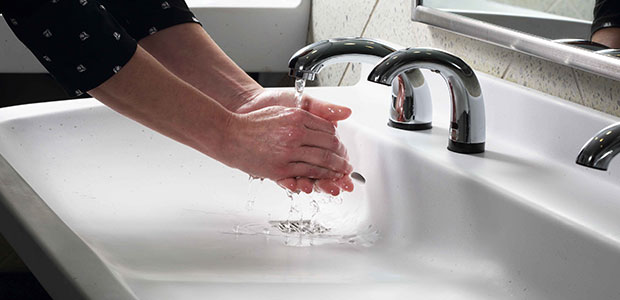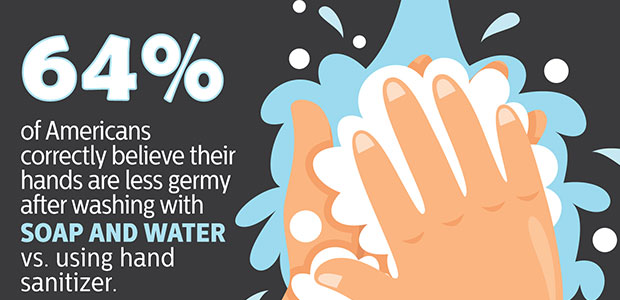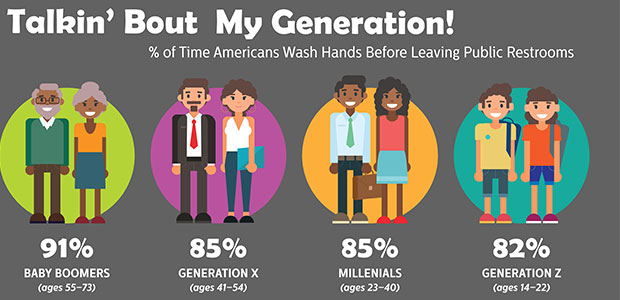
Bathroom Hand-Washing and Flu 2020: What You Could be Doing
Washing your hands is more important than you might think--especially during flu season.
It’s flu season, and this year’s flu virus is causing rising concerns, especially given its severity. With the flu virus comes shared germs, coughing and sneezing, and an overall higher likelihood of contracting the sickness from someone else. Washing your hands is more important than you might think.
Public bathrooms are one of the most common places you can contract an unwanted germ or virus. However, spots like door knobs, keyboards, and even office kitchens breed germs, too. One survey was particularly interested in learning about the nature of hand-washing in public restrooms and which generations are better at it than others.
We’ve been told to do this since we were little: wash your hands after you use the bathroom. Plain and simple. However, the sanitary value of that idea is often overlooked, scientists say. First of all, germs hang out in the bathroom for a long time, and you never know what kinds of germs you might come into contact with. Second, there’s no telling where these germs reside. They can be on toilet seats, door handles, sinks, or even the stall door.
It’s also important to remember that water alone does not wash off all bacteria. While it might help fight off some infectious bacteria, you need soap and water to disinfect your hands fully—and this goes for hand sanitizer, too, which is not as effective as soap and water.

And yes, you should wash your hands if you go number one, number two, or anything else—men and women alike.
Industrial safety equipment and commercial plumbing manufacturer Bradley Corp. released results on hand-washing that might make you question the sanitation of your peers’ hands. The study’s results from the Healthy Hand Washing Survey found that between Baby Boomers, Gen X, Millenials, and Gen Zers, commitment to hand washing decreased the younger you were. Baby Boomers washed their hands nearly 91 percent of the time after using the bathroom whereas Gen Zers did so only 82 percent of the time.
With flu season in full swing, and an increasing concern for this year’s aggressive strain, hand washing should be a top priority for everyone who uses a public restroom. The study also provides other bathroom behavior tips to avoid germs, flus, colds, and sickness.

See the below news release from Bradley Corp.
Concern About Contracting Flu Hits All-time High
Survey Reveals Americans Rely on Hand Washing as Top Defense
Menomonee Falls, WI (January 23, 2020) – This year, concern about contracting the flu is rampant. According to the Healthy Hand Washing Survey, 60% of Americans are extremely or quite concerned about catching the flu, compared to just 32% who felt that way four years ago. Among all age groups, Millennials expressed the most trepidation about getting sick.
The survey also found that, in response to flu outbreaks, Americans become more conscientious about hand washing when they’re out and about. Nearly 80% say they wash their hands more frequently, more thoroughly or longer after using a public restroom.
The findings are part of an annual survey conducted by Bradley Corporation that queried 1,005 adults and youth throughout the United States about germs, the flu, colds and hand washing habits. The respondents represented four generations – Gen Z, Millennials, Gen X and Baby Boomers.
With flu concerns prevalent, the national survey revealed that nearly two-thirds of Americans correctly believe that hand washing is more effective in removing germs than hand sanitizer – a fact supported by the Centers for Disease Control and Prevention.
“Thorough hand washing with soap and water remains the best way to reduce the spread of disease-causing microorganisms when caring for sick family members,” says medical microbiologist Michael P. McCann, Ph.D., professor of biology, Saint Joseph's University. “Soap and water, used as per the evidence-based recommendations of the Centers for Disease Control and other government agencies, will help reduce the spread of flu and other illnesses in the home and work place.”
Overall, germ avoidance is top of mind. At home, if someone is sick or if a cold or flu virus is going around, Americans kick into action. 65% wipe down bathroom and kitchen surfaces and 47% wipe door knobs and handles.
And, when they’re sick, respondents say they change the way they greet people. 54% wave hello, 48% avoid shaking hands and 18% use a fist or elbow bump to avoid hand-to-hand contact.
In a public restroom, 93% of Americans try to avoid coming in contact with germs by employing evasive measures. 65% use a paper towel when touching door handles, faucets or toilet flushers and 44% operate the toilet flusher with their foot.
“Americans are increasingly employing defense mechanisms against sickness,” says Jon Dommisse, director of strategy and corporate development for Bradley Corp. “During the cold and flu season – and year round – everyday preventive measures like hand washing with soap and water can help stop germs in their tracks.”
While 97% believe it’s important to wash up after using a public restroom, hand washing doesn’t happen all the time. Respondents said they washed their hands 86% of the time after using a public restroom. Gen Z was the least diligent, clocking in at a consistency rate of 82%. At the other end of the spectrum, Boomers were the most consistent since they lather up 91% of the time after using a public restroom.
Unfortunately, there is also a rinse-and-run phenomenon. 67% admit they’ve skipped the soap and simply rinsed their hands with water after using a public restroom. Of all the age groups, Gen X is mostly likely to short cut hand washing with 73% admitting they’ve only rinsed their hands.
The 11th annual Healthy Hand Washing Survey by Bradley Corp. queried American adults and youth online Dec. 11-16, 2019. Participants were from around the country, were 14 years and older, and were fairly evenly split between men and women (47% and 53%).
Bradley is a leading manufacturer of commercial plumbing fixtures, washroom accessories, restroom partitions, emergency fixtures and solid plastic lockers.
For more information, visit www.bradleycorp.com/handwashing.